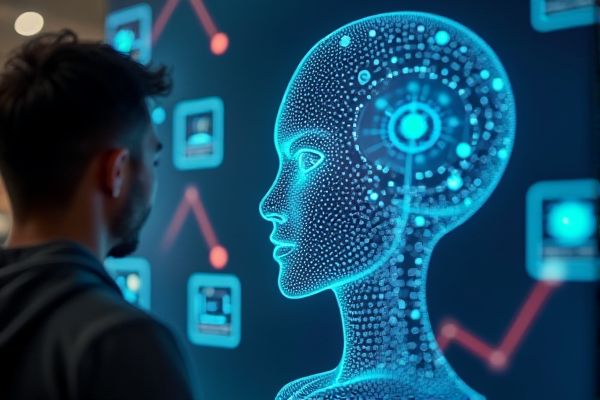
AI applications in marketing enhance customer engagement through personalized content recommendations based on user behavior and preferences. Predictive analytics tools forecast consumer trends, enabling businesses to tailor their strategies effectively. Chatbots provide real-time customer support, improving response times and customer satisfaction. Automated ad campaigns utilize machine learning algorithms to optimize targeting and budget allocation, maximizing return on investment.
AI usage in marketing
Personalized Customer Experience
AI usage in marketing can lead to a more personalized customer experience, enhancing engagement and satisfaction. For example, companies like Amazon utilize AI algorithms to analyze customer behavior and recommend products tailored to individual preferences. This level of personalization can increase conversion rates and customer loyalty. The potential for improved targeting and efficiency in marketing campaigns represents a significant advantage for businesses adopting AI technology.
Predictive Analytics
AI usage in marketing enables businesses to utilize predictive analytics for forecasting consumer behavior. By analyzing past data patterns, companies can identify trends and personalize their marketing strategies accordingly. For example, a retail brand can use predictive analytics to optimize inventory by anticipating which products will be in demand. This approach not only enhances customer satisfaction but also increases sales potential and operational efficiency.
Chatbots and Virtual Assistants
AI usage in marketing has the potential to enhance customer engagement and streamline communication. Chatbots can provide instant responses, improving customer satisfaction and possibly increasing sales conversion rates. Virtual assistants can analyze consumer data to tailor marketing strategies, making campaigns more effective. Institutions like Gartner highlight that integrating these technologies into marketing can yield significant competitive advantages.
Content Creation
AI in marketing can enhance content creation by streamlining processes and personalizing user experiences. For instance, tools like ChatGPT can assist in generating engaging copy tailored to specific audiences. This technology allows companies to produce more content in less time, increasing overall efficiency. The potential to analyze vast amounts of data also helps identify trends and optimize strategies, providing an advantage over competitors.
Audience Segmentation
AI enhances audience segmentation by analyzing consumer behaviors and preferences. With tools like customer relationship management (CRM) systems, businesses can identify specific niches and tailor their marketing strategies accordingly. This approach allows for personalized messaging, which can lead to higher engagement rates. For example, a company like HubSpot can leverage AI-driven insights to effectively target potential customers based on their interests and purchase history.
Sentiment Analysis
AI in marketing enhances decision-making by providing insights into customer emotions through sentiment analysis. Companies like Brandwatch utilize these tools to assess public perception and tailor their strategies accordingly. This ability to analyze large amounts of data increases the likelihood of creating resonant marketing campaigns. Employing sentiment analysis can lead to higher engagement rates and improved brand loyalty.
Automated Advertising
AI usage in marketing can significantly enhance targeted advertising efforts. Automated advertising platforms, such as Google's AdWords, leverage machine learning algorithms to tailor ads based on consumer behavior. This personalization can increase engagement rates and improve conversion metrics. Companies that implement AI-driven strategies might find greater efficiency in their marketing spend.
Social Media Monitoring
AI usage in marketing can significantly enhance social media monitoring by analyzing user behavior and sentiment. Companies like Hootsuite have implemented AI tools to track brand mentions and customer feedback on various platforms. This technology allows brands to respond more quickly to trends and customer needs. Brands leveraging AI can gain a competitive advantage through targeted campaigns and improved customer engagement.
Lead Scoring
AI usage in marketing can enhance lead scoring by analyzing customer data to identify high-potential leads. For example, platforms like HubSpot leverage algorithms to rank leads based on their engagement and behavior patterns. This targeted approach can maximize conversion rates and optimize marketing spend. Companies adopting AI-driven lead scoring may experience improved sales efficiency and better alignment between marketing and sales teams.
Conversion Rate Optimization
AI usage in marketing can enhance conversion rate optimization by analyzing customer behavior and predicting their preferences. For example, tools like Google Analytics utilize machine learning to provide insights into user interactions on websites. This data enables marketers to tailor their campaigns more effectively, potentially increasing engagement rates. The chance of improving overall sales is greater when strategies are informed by AI-driven analytics.
 techknowy.com
techknowy.com